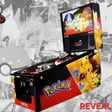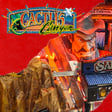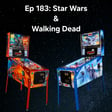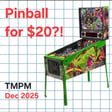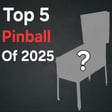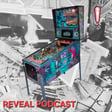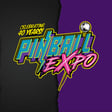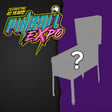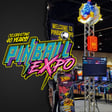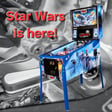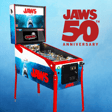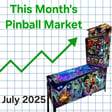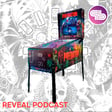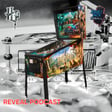Become a Creator today!Start creating today - Share your story with the world!
Start for free
00:00:00
00:00:01

Spike 3 and Home Pin with George Gomez | Stern Pinball's Chief Creative Officer
The legendary George Gomez joins us to talk about what is right around the corner for Stern with Spike 3, Home Pin, and the job changes.
Transcript
Introduction: Loser Kid Pinball Podcast and Stern's Jaws Release
00:00:07
Speaker
Thanks for tuning in to Loser Kid Pinball Podcast. I am Josh Roop with me, my co-captain. Scott Larson. And Scott, we've got and amazing episode today. I'm excited for it. ah Plenty of Stern machines are being released right now. We just had the Jaws 50th that came out.
00:00:20
Speaker
It sounds like someone dropped a pinball machine upstairs. Yeah. i you know like I don't know what just happened. No kids bleeding so far, so I think we're
Promo and Buying Tips for Stern Machines
00:00:28
Speaker
okay. But if you want some new CERN pinball machines, where are you getting them, Scott?
00:00:31
Speaker
I'm going to call Zach and Nicole Manny at Flippin' Out Pinball. There's a lot of great options out there. And, you know, there are some that are coming out too. So ah reach out. ah Looking for accessories too.
00:00:43
Speaker
um I'm always looking ways of making my machine look a little better. Also, any old games that you may be interested in. and They have a good ah program that you can find some old ones too. So Zach and Nicole Manny Flippin' Out Pinball.
00:00:55
Speaker
Definitely, if you're looking for that fun house too, just ah type in Loserkid in your promo code on checkout or talk to Zach and Nicole and they'll get you set up for that to get a new fun house
George Gomez on Tron and Pinball Industry Contributions
00:01:04
Speaker
in your house. All right, this man came into the scene in the early 80s with a small game called Tron.
00:01:11
Speaker
and I would say that has kind of weirdly red redefined our world. Like it's become a cultural staple. And ever since then, he has made game after game that has just wowed us.
00:01:23
Speaker
And when we talk about like the Rushmore of pinball, George Gomez would definitely be up on it for all of his accomplishments and whatnot. So I want to thank the man for coming on today. George, think for thank you for joining us.
00:01:36
Speaker
Thanks guys. It's great to be back with you this time with hopefully less pressure than the last time I was on.
Feedback and Emotional Reactions in Pinball Development
00:01:44
Speaker
talked about the WIC controversy. WIC Dungay.
00:01:48
Speaker
so Um, you know, uh, always happy to, to talk with people and see if I can, um, answer questions and lighten you on anything that, um, I certainly there's a lot of confusion about stuff, um, from the outside in. Right.
00:02:12
Speaker
Well, isn't kind of funny, too? Like, you bring up Gun Gate, and it's like, that that felt like so long ago, but it was like, was kind of funny. We had to have yeah had you on because you figured that you were the man to talk about it, and it just seems so silly now compared to where it was, like, 20 months ago. Yeah, I mean, it's...
00:02:30
Speaker
it's hard It's hard when you so first see a game because the first thing you see is yeah it's it's like a movie poster. It's not like you get to see the interaction. Once you see the video assets, you're like, okay, well, if that's really what you're hanging your hat on, that seems a little silly. But ah there there's certainly enough wick in the game to make it to ah relevant for wick fans. i mean i think the you know i think I think that um there's a thing that happens in the pinball community where people see...
00:02:58
Speaker
or hear things and they they they imagine them a certain way. And so I see lots of, you know, sometimes I see people react very negatively to something and then like a week later, they love it no or vice versa. Right. It's like, you know, um a lot of emotion, a lot of drama.
00:03:21
Speaker
Well, that's probably good because it means people care about the product, right? i In some ways, it would be worse if you put out something and you heard nothing. Absolutely. so just So there's something
Stern Pinball Machines at Costco and Market Impact
00:03:32
Speaker
like that. Now, the reason why I thought about bringing on is ah a couple of things. There's been a lot of shakeups at Stern, but I also, when I was down in St. George this weekend,
00:03:42
Speaker
I went into Costco and I walk into Costco and anybody who's been to a Costco know they're all laid out the same. So I walk past all the electronics and at the very end of the electronic thing, before you turn the corner, there is a Star Wars home edition.
00:03:58
Speaker
ah the the Costco Home Edition. And we've done this before. We actually didn't get the Costco Home Editions here in Utah ah the last the last go around. So this seems like a a couple of things.
00:04:11
Speaker
It seems like a bigger release, like mass penetration for one thing. Two, i I noticed there were people waiting in line to play it. I played a quick game. I didn't want to dominate.
00:04:24
Speaker
but it played very well. It was a great representation, which I'm sure they don't have text that they're setting them up at Costco. They probably just opened up and followed the video. yeah And so a couple of things, this seems like ah this seems like a good way of of getting back into it. So how did this come about to re to to reintroduce having machines at Costco again?
00:04:50
Speaker
Right, so
Strategy Behind Affordable Home Editions
00:04:52
Speaker
let's go back in time. the very first time you saw them there um was a bit of an experiment, and so on their part and ours,
00:05:01
Speaker
um And so, you know, that meant that it was in more limited, you know, more limited geographic geographic locations relative to their, you know, their stores.
00:05:13
Speaker
and And so, they had, we you know, we had success with it. um And so, they liked it and they said, let's do this again. and so The, you know, the titles we, ah first of all, the, you know, both the, this particular home edition, you know, I designed this game a long time ago.
00:05:32
Speaker
Right. And we did a run of before Costco, you know, there, there was a run of these games that was made um long before, even before.
00:05:43
Speaker
the Jurassic Park game. Right. And so, ah so this time around, they said, you know, clearly yeah what from our perspective, what we're trying to do is expand the the universe of pinball.
00:05:56
Speaker
Right. So this is an audience that is potentially new and, and these, these games are intended to essentially be a gateway, meaning they're, know, they're, they're more affordable.
00:06:11
Speaker
Um, we want people to get to know and love pinball, perhaps put them in places where it's, it's, it's more difficult to put a full commercial game.
00:06:24
Speaker
So, and then eventually we want people to love it so much that they will go into the big games. Right. um So, I mean, that's, that's always been the, you know, we've tried, you you know, we going back, you probably 10 years, we've, we've tried many different versions of home additions.
00:06:48
Speaker
because we want we want that expansion, right? We want the market expansion and we want, um you know, that yeah i mean, we're all about growing the audience.
00:07:00
Speaker
So that's a
Engineering and Design for Home Editions
00:07:01
Speaker
way for us to grow the audience. It's a new audience. you You've noticed we put a lot of work into the box, right? Because, you know, it has to be, it has to totally look and feel like a consumer product.
00:07:15
Speaker
This particular version um A lot of work has gone into making it as user friendly possible, right? The out of box experience and also lots of attention to durability and reliability because it's going into consumer environments in a different way.
00:07:36
Speaker
ah per you know The people may not know how to fix or where to get you know, where to get the game fixed or they they may not even know we, I mean, we've gone so far as to, we've designed a system that allows you to put the balls in the game without taking the glass off.
00:07:52
Speaker
We've, um you know, there's a whole setup video that goes with them. There's, you know, there's QR codes that, that help you set, you know, set it up. the The new menu system, which you're you're starting to see on some of the games, and it's actually designed for Spike 3, that, um that is in these games.
00:08:11
Speaker
um There's a lot of things that, Uh, so a lot of attention to the out of box experience, a lot of attention to reliability and durability. Um, they have full commercial play fields now.
00:08:24
Speaker
So, you know, it's the same plywood, um you know the same plywood sandwich, it's going into your, your commercial games, the maple top and bottom, all of that stuff. Um, of course, all the max, um, the same max, you know, same flipper assemblies, same pop bumpers, um, same electronic system.
00:08:44
Speaker
Um, the, the beauty of spike is that, you know, you guys know it's modular. So it's always be, you know, we can scale it up and down. So those games, the limitation with those games is we do the entire game with a single node board.
00:08:56
Speaker
So, um, you know, and that's really just about trying to, um, keep the cost affordable. Uh, the other thing that happens, you know, you get a lot of reliability by simply by, by strictly focusing on simplicity.
00:09:14
Speaker
Right. So simplicity inherently buys you some element of reliability. Um, we watched, you know, we watched the Jurassic parks. Uh, we know what broke, we know what was right. We know what was wrong. And so this is another bite at the apple. Lot of, lot of engineering went into this game. So I think they're going to, I think they're gonna do really well.
00:09:35
Speaker
And I think, you know, I think next, next fall, you'll see another game.
00:09:43
Speaker
Well, and i was back that's
Adapting to Market Changes and Economic Conditions
00:09:45
Speaker
actually what I was about to ask. If home pins are going to become a thing at Costco, one other thing too is, I mean, it's it's easy to see the economy isn't what it used to be a couple of years ago.
00:09:55
Speaker
And having your traditional dealer distribution buyer base may not be able to take on what they used to. Is this a way to keep the line running and to help keep Stern employees working, but still get product out the door and keep the factory moving?
00:10:13
Speaker
At this point, it's not a significant enough. I mean, I don't like, we don't think of it that way. um are you know, i'm ah honestly, our business, while it's compressed, it hasn't compressed any significant amount relative to like, you know, it's, it's less than it was during COVID, but it's, you know, it hasn't, you know, um ah you know, Jaws has done really well.
00:10:44
Speaker
D&D has done really well. um You know, for the most part, we haven't, you know we We have felt it in things, you know, in like clearly we don't have, you know, during dry during COVID we had, you know, a year and a half productions worth of back orders. So it's not it's not like that anymore, but it's more what business was before that time, right? Meaning that there's a, you know, there there's a consistent number back orders. There's, you know, you're making
Challenges and Support for Costco Pinball Machines
00:11:17
Speaker
games at a rate.
00:11:19
Speaker
we haven't seen, you know, ah like, you know, the factory is, you know, there's 500 people out there today, there were 500 people out there, you know, six months ago.
00:11:30
Speaker
One question I have is when you buy through a dealer, typically, um if someone has never set up a machine before, there are lots of little fiddly things, okay?
00:11:41
Speaker
And so, When you're going through Costco, they don't have an expert of pinball at the location. i mean, you're taking it home and you're setting it up yourself. So should people encounter any issues?
00:11:54
Speaker
Is there a direct line to Stern? Like how do you deal with those technical support issues that always come up with machines? Right. So, so we, you know, I don't know if you guys know this, but we have, um, we have a network of people that just, you know, that, that we can send anywhere to, to deal with stuff. Right. So like if you, um, a lot of them are the same people that somebody like Zach is using, if, you know, if he sells a game into Ohio or whatever, right.
00:12:27
Speaker
so um So, I think there's – your first line of the defense is stern tech support. and And a lot of the engineering focus was in, you know, a let's make sure we screw it together right. B, let's let's make the out-of-box experience um as consumer-friendly as possible. And C, if they do need help, let's be there for it.
00:12:51
Speaker
um It's really not a lot different. and The same guys that service that service your commercial games. so and And like I said, simplicity brings a lot of reliability inherently.
00:13:08
Speaker
So if the home pin is going to be a thing with Costco, are you guys going to go back to the well and just use what you've already built? Or is there going to be more home pins coming in the future for different
Future Releases and Themes for Home Machines
00:13:16
Speaker
themes and whatnot? No, you'll see new themes, right? Like next year's theme, you'll see a new theme.
00:13:21
Speaker
We just happen to have, so we have, you know, we had the Star Wars, Star Wars is, you know, it's an evergreen license, right? It's like. 100%. Yeah.
00:13:33
Speaker
You know, so you like, how would you not, you know, you're talking about, you're talking about a consumer market that they're going to gravitate to, you know, a Jurassic Park, they're going to gravitate towards, you know, a ah Star Wars, you know, you may see,
00:13:50
Speaker
So think of the, think of the large broad appeal licenses. That's what you're gonna see in, in those environments. Those home additions are going to be whenever, you know, you're, you're probably not going to see, um you know, you'll probably see something like, uh, uh, uh, a broad appeal family theme long before you see like, uh, um, you know, a rock band or ah more narrow,
00:14:19
Speaker
ah see Does that give you more of an opportunity to take chances with cornerstones, like with Dungeons and Dragons and stuff like that as well? um Not sure.
00:14:30
Speaker
um i mean, it definitely, like something like ah like the Dungeons of Dragons would definitely, and you know, is a theme that would end up there for sure.
00:14:42
Speaker
you know that i could see that landing you know I could see that landing at a Costco for sure. um what ah what you know um One of the things that I've been thinking a lot about is how do we make
Creative Challenges in Pinball and Toy Industry Parallels
00:14:57
Speaker
how do we leverage, you know we're ah we're leveraging elements of the big game to create the little game, right? So a lot of the content in the Star Wars game came from the big Star Wars game.
00:15:09
Speaker
um A lot of the art came from the big Star Wars game, right? So you can imagine that you know I'm using the same Death Star tool um you know for the for the toy i'm using the same tie fighter from the big games so i want to do more to leverage the effort for the big games to make the effort for the home editions um more efficient One thing I liked on this game is that the ball lock, it's it's on the play field. It's a physical lock and it's very visual.
00:15:44
Speaker
And so to start multiball for a novice, you can easily say, hey, that ball is sitting there. Go ahead and hit that ball. And then it starts a multiball. And so i I was really impressed with how that was integrated. It was it was the most intuitive way um on a on a cornerstone game. A lot of people who are into pinball, they're going to know, oh, the green light, that's a lock.
00:16:07
Speaker
And that's how you can start multiball. But for the average person, you're not going to have that intrinsic knowledge that you build up over years of playing pinball. So I'll tell you that I did that on the very first time.
00:16:19
Speaker
You know, the very first, like I want to say it's on Supreme, it's on Spider-Man, it's the same device. And I did it, but I i did it for a different reason.
00:16:30
Speaker
I did it because I was trying to get a feature, ah physical feature without any devices. So, you know, I wanted to, you know, the the actual act of hitting the ball is what frees the ball.
00:16:45
Speaker
And the actual, you know, the the fact that the ball rolls in there is what locks it. So I was looking for, like, I'm always talking to guys here in the studio about how do you do something with nothing?
00:16:59
Speaker
And the the magic of the home additions for me, when, you know, I've done most of them, ah you know, Jack did the Jurassic Park game, but I've done most of them to date. Like I did Supreme, I did Spider-Man, I did all those.
00:17:13
Speaker
and the and And really though that play field is an evolution those, just for economy's sake, that's, you know, that's it's just an evolution of that. the But the the the ah challenge, and it's a really fun, interesting challenge to me, is how do i do something cool with very little?
00:17:35
Speaker
um You know, when I, and and there are designers in the building that, you know, maybe think otherwise, like, like you know, I know I want all the stuff. No, I get it.
00:17:46
Speaker
I get it. You want all the stuff. But
Variety in Game Designs and Intuitive Play
00:17:49
Speaker
the real design challenge is how do you make something cool with nothing? right To me, that's pretty interesting.
00:17:57
Speaker
So um that's why know you know when we first talked about this, not too many guys want to raise their hands to work on it. So I said, you know what? I'm going to take it.
00:18:08
Speaker
I'm to it because i think you know i think I think it'll be a lot of fun. How do I do something with very little? you think part of that comes but from your background in making toys and stuff too? Because you have to kind of minimize there as well, right?
00:18:22
Speaker
Absolutely. The toy business, you know, you see something on the shelf at a toy store, divide by five, that's what it really costs. So you can imagine, you know, you can imagine a guy trying to make something cool with $5.
00:18:36
Speaker
five dollars no is but In some ways, I think this could be an asset though. I i have Beatles, which is you know a new version of a single level, right?
00:18:50
Speaker
And I like that it gives me a different option. It gives me a different vibe and it's a lot more streamlined, a little bit like what you guys did with ah Bond 60, where you know yeah it's a street level game that has paths.
00:19:04
Speaker
And I like it because it does give me a different feel. And it seems
Enhancing Sound Systems in Pinball Machines
00:19:09
Speaker
like, you know, it, I guess I would argue, ah you know, a reader, like they love those novels that are 800 pages, 900 you know, the really deep ones.
00:19:19
Speaker
But sometimes it's fun to have 150 page burner that you're just, I'm just going to go and I'm going to have fun. I'm going to sit at the beach and I'm going to flip through this. And this feels like, Hey, this is such a great game that I can come up and, you know, people are like, okay, explain to, explain to me how to play this. And if I, if I get one of these games behind me,
00:19:38
Speaker
It takes me a minute to explain, well, you need to set this up and then start something. But when you have that, it's like, go. it's It's super, super fast. Just whatever you hit, it'll be good.
00:19:49
Speaker
Yeah, I think, I mean, it's, um they're designed to be what they are, meaning that, you know, it's, you know, bring it home, Family entertainment.
00:20:01
Speaker
it It's really simple. It's enjoyable. It's a lot, you know, it it this one has, you know, it's got a bigger screen than the last one.
00:20:13
Speaker
The sound sounded a little more, it seemed a little louder than previous home editions too. Did I hear that wrong or did it just sound better than I thought? You know, it doesn't have any more speakers than the last set.
00:20:29
Speaker
Okay. But there's there were but you know we did we we have tried to improve almost everything. So you know it's possible that you know that's got you know that it's got the same – instead of two um you know speakers like – it doesn't have the woofer in the cabinet.
00:20:51
Speaker
yeah And it's got the same speaker that's in the commercial game i um have you Have you played or have you heard what Mark Silk did to his game?
00:21:04
Speaker
So he has a Star Wars Home Edition. And he actually modded it. So it he had ah different, he he added an amp and he had he changed out the speakers and put a subwoofer.
00:21:16
Speaker
And it is it it is like you're in a theater because when you hit the button, ah yeah know that that that opening thing, it it just overwhelms you. Like, this is awesome. like i Have you ever considered adding that as an option to say, hey,
00:21:32
Speaker
If you want, and you have kits, you have like speaker light kits and you have, you know, topper kits and it's like, Hey, maybe Stern, if you want buy a, a, an upgraded speaker kit, even for the home edition, I wonder if there's enough demand to make it worth your while.
00:21:49
Speaker
So it is designed so that you could upgrade it if you wanted, um And you're gonna see, you know, we're, I'm sure you guys want to talk about Spike 3.
00:22:01
Speaker
And
Upcoming Spike 3 System and Technological Improvements
00:22:02
Speaker
when we do Spike 3, you're gonna see that um there is there, there, one of the things that you're getting is a much improved sound system. And um with a much improved sound system, we're making it so that um if if the, you know, for example, if LEDs or music games ship with the much improved sound system, you can add the much improved sound system to everything you have.
00:22:27
Speaker
um And it is impressive. i think you'll I think you'll like it when you see it. And so, yeah, I mean, it's easy to upgrade.
00:22:40
Speaker
Everything's there. You just have to- Know how? Yeah. Yeah. Everything's there. But I mean, and and, you know, you never know the kit that upgrades, you know, we we could probably create an evolution of the kit that that's going to upgrade the Spike 3 games.
00:23:00
Speaker
So you keep talking about Spike 3, and I want to know, because this was originally announced at Expo in 2021, and um it's it's been almost four years now. How close are we? Are we going to see this in the next game? Yeah, he probably will see this the next game.
00:23:13
Speaker
In the next game? nolan I know. One thing you talked about, Expo, is maybe redesigning the cabinet a little bit to be a little better streamlined and to kind of trim some stuff down. Yeah, you're going to see the – you're going to see – so let's talk about Spike 3. So you don't realize it, but you've been seeing bits and pieces of it for a little while.
00:23:34
Speaker
You got the quiet power supply. you know You're getting the improved menu system. There's little things that have been sort of rolled into the line.
00:23:46
Speaker
um and and the way when we launch spike three the there's you're gonna see some cabinet improvements that have to be there because of the improved sound system and because of um the improved display but there's going to be further improvements like the the like the big cabinet improvement is probably going to lag it it's probably going to come in you know maybe not you know it won't be there for the first game it'll probably be there for the second game So you'll get the bulk of the, you know, you'll get the bulk of the system when you, when, you know, with, with probably with the next game and then, and then you'll see even further refinements.
00:24:29
Speaker
I know you can't exactly say everything that's going to be involved, but talk I want you to talk about the the limitations as a designer that you encounter on the Spike 2 system. Because usually that that's what drives innovation is whatever whatever environment you're working in, you come ah you you come to an impasse and you're thinking, I wish there were a better way to implement my ideas. And I'm assuming that's what's been pushing Spike 3.
00:24:57
Speaker
Well, so actually not. Oh, okay. All right. Tell me where I'm wrong. Great. so so so that So when you think about Spike 2, what I want you to consider is the breadth of games that we've done on it.
00:25:16
Speaker
And for example, just think of all the different video display things that we've done on Spike 2 games. and I mean, really take a good hard look, right? Like everything from full-on movie you know movie clip games.
00:25:34
Speaker
you know For example, one of the very early Spike 2 games, Batman, Batman 66, tons of video content, right? Of of of TV, you know, footage.
00:25:47
Speaker
um Look at a game like Metallica with tons of custom, all, you know, all new animation, right? So all of that stuff has happened within the breadth of Spike 2.
00:26:02
Speaker
um So I would say that if anything, we've gotten very good at and doing a lot within the context of the system. So why do we do it? Why would we do a Spike 3? Well, some of it is strictly there technology moves on and so processors improve and you know everything that comes with that has moved on in the time that we've, you know the the beauty of a system like Spike 2
00:26:34
Speaker
yeah I mean, it's been around a while and we have made such a breadth of different types of games on it. And yet technology has moved on. The processor in Spike 3 is substantially more powerful than the and the processor in Spike 2.
00:26:52
Speaker
And with it, graphics everything else. So,
Evolution of Spike Systems and Development Challenges
00:26:56
Speaker
you know, it's an opportunity to refresh the line, right? And it's an opportunity to bring you things that we didn't have in Spike 2.
00:27:04
Speaker
You know, you want to connect your headphones, you know, wirelessly to the game and you want to do, you know, you want to have a better, a more improved sound system and you want, and from our standpoint, we want a tool set that's more current.
00:27:22
Speaker
So to your point, it's not that we can't continue to make games on Spike 2, but it's that Boy, we could you know we could make things a lot easier. can make things a lot better.
00:27:34
Speaker
So think about on Spike 2, the Linux-based distributable that that we operate on is you know hasn't had support for a long time.
00:27:47
Speaker
So the world's moved on and now, you know, we have access to better tools and more efficiency and, you know, just it's easier to do cooler stuff.
00:28:00
Speaker
So those are all the reasons and and, you know, you guys want, you know, you want, I want a better display. I want better sound. I want, you know, i want to connect my headphones. I want, you know, i want more lights. I want more stuff. I want, so it's going to give us all that power.
00:28:17
Speaker
Definitely. Well, and can you talk about, cause we're, we're talking spike three right now, but it's funny cause like white star was around for about seven years and then Sam system was around for about seven years. And then spike one was only around for like two, three years before you guys upgraded to spike two. And the spike two has been out for more than a decade now.
00:28:33
Speaker
Yeah. So why was spike one only a couple of years and we've had spike twos for so long. And then, ah Are you guys just trying to get it all right with Spike 3 before you reveal it so spike one ah so the so Spike 1 was a paradigm shift in how you design ah pinball hardware set. Meaning that you know the notion of ah of of a networked system within the pinball machine was
00:29:10
Speaker
radically different. the the you know the the The nodes supporting different architectural areas of ah the game, the expandable and and um you know modular version of the notion of a system that supports pinball machines, this was all new stuff relative to how the prior systems had been done.
00:29:34
Speaker
So it took us like we we went down that direction and like anything else, we learned a lot very quickly. And so we found limitations in Spike One, which quickly made us say,
00:29:47
Speaker
No, no, no, we gotta do we got to do more to make it what we what we imagined in terms of scalable, modular, you know more expandable.
00:29:58
Speaker
And so while those concepts existed right from the beginning, that's the reason we went in that direction. The the initial execution wasn't quite there for us. We started bumping into things.
00:30:09
Speaker
yeah yeah One of the very first things we bumped in is bumped into is we had this idea which actually survived into Spike 2 and has made Spike 2 very successful, which is ah custom node when you know you you you design generic nodes to do the things you know you have to do.
00:30:30
Speaker
and you add them and subtract them as needed. ah great example of that is the home additions versus an LE, right? That has an LE has the kitchen sink in it and a home addition has almost nothing in it.
00:30:44
Speaker
And so you have
Navigating Production Challenges During COVID
00:30:46
Speaker
to be, able you have a system, the very same system supports both. um When we did Spike 1, quickly figured out that we had created a lot of complexity in different kinds of generic nodes and in fact, somehow created more complexity for ourselves than we needed to.
00:31:07
Speaker
So we said, you know what, let's do the core nodes and then let's do custom nodes when we need something special. We need the support of display on the playfield for Star Wars.
00:31:18
Speaker
That's a node. we need us We need to support a different thing that doesn't exist. We create another node. All the nodes go into the on the shelf, they go into the inventory, designers take them off as they need them and use them and apply them.
00:31:32
Speaker
So yeah, that's the reason we got out of Spike 1 quickly because you know, we learned a bunch of things that we didn't know. And so, and Spike too, the other thing that happened with Spike Wan is that we started thinking about the notion of how ah how does the system have a long life?
00:31:56
Speaker
and And right away, we bumped into things. We said, okay, we got to improve that if we want that to have that to be that sustainable for that long. You compare that system to anybody else's pinball system, nothing has been as reliable, nothing has been manufactured in the quantities that it has been.
00:32:15
Speaker
um and you know, nothing has been as flexible. Well, I have to say it was very flexible.
Advancements in Sound Systems and Connectivity
00:32:22
Speaker
I know we talked to, can't remember the gentleman that works there, but we were talking at Expo a couple years back and they were talking about the challenges you guys faced with COVID because everything was in high demand and the chips that you were getting were also the same chips they were using for like the F-150 trucks.
00:32:39
Speaker
And it was like they had a month to figure out how to because Godzilla was coming out. They had a month to figure out how they were going to go from not having any of these chips to mass producing Godzilla because it was time.
00:32:51
Speaker
And so it's impressive. i think it speaks to you guys and your company of how you were able to find challenges and overachieve and overcome them. Right. Yeah. The electrical engineering group during COVID, um the you know, the what they call the AVL, the approved vendor list for components on a board.
00:33:14
Speaker
AVL was changing monthly. I mean, it was crazy. um Those guys did such a great job. And and to your point, Spike is what allowed them to do that.
00:33:31
Speaker
with Spike 3, I'm assuming that that will change your ability to even do more with presentation. and And so tell me about when you're choosing to present a game, because things like expression lightings, which I think yours is the best in the game.
00:33:48
Speaker
I was just integrated into the side. It looks smooth. it looks seamless. And the light show that you guys do on those. which is see You're not going to see them until the... You're probably going to see the new generation of expression lights will will happen probably when the when the new cabinet happens little bit after the intro of Spike three, probably the game after.
00:34:14
Speaker
But that, yeah. yeah Get ready. Yeah. Okay. That's great. And you're bringing that in the one Achilles heel that, that games that are so dependent on sound, which would be music games.
00:34:30
Speaker
Like the Achilles heel has always been, i you go to Logan's arcade, which is a great arcade. It's so loud in there that you, yeah you just have to know what you're doing. Like you're not going – you can't really hear the call outs.
00:34:43
Speaker
And you mentioned you know people want to play with headphones. So like what does that mean? Does that mean just bringing and plugging
Remastering Older Games and Technical Challenges
00:34:50
Speaker
into a jack? Does it mean Bluetooth connection? Does it mean a different or I guess maybe something you're looking at in the future? It's going to be a lot more sophisticated than plugging into a jack.
00:34:59
Speaker
Yeah. like I said, the sound system is going to be impressive to you, I think. And I think that a lot of engineering has gone into a lot of things.
00:35:11
Speaker
I, you know, it's taken us this long because we, we continue to be, you know, we, we continue to have to produce games in the context of we're also developing a system and we're also supporting insider connected and we're doing a lot of things.
00:35:27
Speaker
Right. So, and you know, we, am you know were designing home edit we're supporting an accessory program and you know we're a little busy. So it's taken taking us even and yes, not the same, not everyone works on everything, but it's still collectively these projects happen in the studio.
00:35:51
Speaker
And so um it's a lot of stuff.
00:35:55
Speaker
So Scott brought up Metallica Remastered. yeah um with From the outside looking in, it looks like Metallica did fantastic. And and the idea that these remastered games are definitely a demand for them.
00:36:08
Speaker
i assume moving forward, you guys want to do more. Is Spike 3 going to be capable of easily translating the older games like Sam and White Star to help ah evolution, a catalog of of these remastered games?
00:36:24
Speaker
So Spike 3...
00:36:27
Speaker
can definitely support them. I don't know that it's going to give us, um, I mean, one of the things we get with spike three is we get better tools.
00:36:38
Speaker
So the you know, the, the, the tool set that allows us to put content in the games improves, but the reality is that, you know, you're talking about, um,
00:36:52
Speaker
an effort to translate ah technology from a long time ago. it it it so the system could certainly support it. um it's not that's never That's not been the challenge. The challenge has been the amount of work that we have to do um to to do that translation.
00:37:12
Speaker
And so that translation is really the, and it's not it's not hard, it's just work. So you say to yourself, So you look at the economics of it and you say, okay, so at best, some of that old stuff is going to probably be, um I mean, Metallica Remaster has been a hit, right?
00:37:34
Speaker
Metallica Remaster is for all intents and purposes. um now Now it's become a product line because, you know, yes, we can remaster our old stuff.
00:37:46
Speaker
um and And so there's always there's the question, what ah what will we remaster and how will we remaster it? And so, but you get into talking white star and those challenges are bigger.
00:37:59
Speaker
those Doesn't mean that they're not impossible, but they're not impossible but there it's not like, you know, uh, a develop, it's not a, uh, a trivial development effort.
00:38:12
Speaker
It's like, okay, it's like, we're gonna, we gotta put some people on this and we gotta really do this. And I mean, look at your remaster game and you know, that's three quarters of the work of a cornerstone in a minute.
00:38:28
Speaker
Right. It just look at those animations. just alone, just look at the animations alone, right? yeah And then, you know and then you you know, a full-on art package, a mechanical engineering pass for reliability on the play field, a game design pass on, you know, sort of how do we make it cooler?
00:38:49
Speaker
um mean, right? You got,
Stern's Accessory Business and Alignment with Releases
00:38:54
Speaker
think 12 more songs. twelve more songs you know It's an effort. We had like a thousand speech new speech calls or something. Well, your challenge with Metallica has always been it's considered one of the best rule sets and codes and by the great Lyman sheets.
00:39:15
Speaker
So how do you honor Lyman's memory and everything he's done and also add another layer to that? And what Raymond has done has been spectacular to say the least.
00:39:30
Speaker
we We did it with those sensitivities in mind. Mm-hmm. Right. Um, it's yeah, we did it with those sensitivities in mind. i mean, it's, it's, it's kind of like, it wasn't, it didn't escape us.
00:39:41
Speaker
so Um, you know, you're, you're talking about somebody, you know, I mean, the man created a lot of masterpiece work, but you know, you just can't ignore, um, you can't ignore that when you sit down to, I'm going to make another one of,
00:40:01
Speaker
Yeah, definitely. You did touch on this, and so I want to transition because people are going to ask. You talked about, you know accessory lines, and and that's always been challenging for Stern. ah Just because, obviously, this is a nice supplemental line, but your main purpose is to make the games, right?
00:40:20
Speaker
So we have we still have some that are we're still waiting on. You know, you have X-Men that are that are coming out, and you have D&D and Kong. ah So just... Want to get your take on the on the updates, on how those are coming and when people are going to be looking forward to those. And I know you have to get a lot of approvals and all that stuff.
00:40:39
Speaker
So one of my focuses this year is to bring accessories closer to future to the release dates of future you know future new releases, right? so um So the accessory business is ah is is a really nice piece of business.
00:40:58
Speaker
And we we agree that, you know, everyone wants accessories when we launch a game. um clearly there's challenges.
00:41:08
Speaker
So there's there's some stuff that I'm doing internally to make that happen. The problem is that there's a little bit of a hangover from stuff that, you know, it was in the pipeline before we sort of made those changes. So, you know, you're probably gonna see X-Men before the end of the year. um You know, you're gonna see, you know, you're gonna see, um you might see Kong sooner, you know, you know you' you're gonna see,
00:41:34
Speaker
um We're still continuing to focus on the accessories. We love the accessories. One of the challenges with the accessories is that some of the integrations require the team.
00:41:45
Speaker
So when the at the same time that the team is mired in making the game and releasing the game and finishing the game, in many cases, um accessories have to happen.
00:41:56
Speaker
And so Uh, and we think there's value in, there, we think they're the best integrations of things like accessories and expression lights and speaker lights and all that stuff are, are the ones where the stuff is truly integrated into the package.
00:42:14
Speaker
It's not just some peripheral, it's a very well choreographed, uh, integration, right. With a rule with stuff that makes it like, okay, now it's, it's a thing I gotta have.
00:42:27
Speaker
um i'll tell you that I'll tell you this, the you're not going to be disappointed. you're You're disappointed that you have to wait for the X-Men topper, but you're not going to be disappointed when you see it. one One question
Potential for Opening Insider Connected's API
00:42:39
Speaker
I had, you know, Insider Connected has been fantastic.
00:42:42
Speaker
um I know you guys have talked about it. just It's been a wealth of information that has really helped drive what you guys are doing there at Stern. ah One question I have is, is Insider Connected's AIP ever going be opened up and allowed for third-party creators to use the data? So, yeah, so it's a ru it's a great question.
00:43:02
Speaker
And and the I'm going turn the question around to you and say, what do you guys see How would you – what would you do with the API?
00:43:17
Speaker
If I gave you the API, what like what kinds of stuff – because it's not impossible.
00:43:27
Speaker
Are there challenges? Sure, there are. I mean, want stuff that's –
00:43:34
Speaker
yeah we of
00:43:37
Speaker
robust and and you know reliable and you know um passes all the requirements and all that stuff. But I mean, it's like, honestly, you tell me, what what would you see? what do you what do you envision?
00:43:53
Speaker
And you know it's absolutely worth the conversation. Definitely. I think it'd be cool to maybe do some custom LoserKit stuff. I think that I don't know, we've we've been working, doing some stuff ah with PinQuest and whatnot, and it'd be cool, made to integrate and be able to help ah location operators and whatnot to help drive more, I guess, customer involvement along with maybe us as content creators or ah those that are other party develop apps. What do you think, Scott?
00:44:27
Speaker
Yeah. And so this is what we do with Pain Quest, which is great because we we tried to find things that were close to their location, but also things that anybody could do so they could upload their scores. and And if they got your challenge and my challenge and they but they got, you know, a loser kid pin that we that, you know, Neil helped create.
00:44:46
Speaker
sponsor and he spent send him out a pin that was the that would definitely be a great way of integrating another thing is i you know i thought of it would be fun for me and we've talked about this before george i know that having all the data is super expensive and people definitely would love to have like i just hosted a pinball tournament here on saturday And so we had, you know, a youth tournament and we had a a women's tournament here and being able to have like a local leaderboard
00:45:17
Speaker
for the tournament that I could, you know, and I'd be happy to even pay for a subscription to say, hey, I'm i'm willing to have that broadcast. so when people come, and it's like, hey, I'm having a pinball night at my house. And now everybody can see, you know, the the highest of the day or the highest of the month and be able to use stuff like that.
00:45:34
Speaker
So that would be, ah you know, that'd be a fun engagement thing just for people coming over. be fun. If you notice me writing, I'm taking notes. Yeah. Yeah, so so that would be great, especially for, you know, just like a game night at my house. And you could even do like a challenge.
00:45:50
Speaker
Who gets the, it could even just be casual game night. Who gets the highest score on this? They get a trophy. Who gets the highest score on this? Because that would be such an easy way to host and then have prizes as opposed to people coming back and and saying what they want. And you notice behind me, most of most of my games are stern.
00:46:07
Speaker
So that would be super easy to integrate. I mean, we're, we're, you know, we're open to stuff like that. We have to, it's, you it's gotta be done in a certain way. It's gotta work in a certain way.
00:46:21
Speaker
um and it, it's not a no, that's for sure. It's, it's just a, we gotta figure it out, um, in, in the best way for everybody. Right. Like, um, you know, the, the,
00:46:38
Speaker
you you know this from the the real world, um when ah when somebody opens up their environment, um you know, there's challenges, right? There's security challenges, there's all kinds of things, right? It's the reason, you know, Apple for a long time held, you know, kept their environment so, so, you know, closely guarded, controlled, you know, um, and, and of course, you know, the, with the advent of app stores and everything else, you know, you, you begin opening the doors a little bit, right.
00:47:18
Speaker
But stuff still has to be managed and, and has to exist a certain way. Um, so yeah, it's not out of the question at all, not the question. It's just something, you know, it's the thing we got to figure out How do we do it? How do we do it in a way that works for everybody?
00:47:34
Speaker
Definitely. Yeah, because it would be cool for a location to have its own custom quests to help drive more engagement and stuff like that as well. Because the leaderboards have been fantastic. It's great to go to a local bar and say, hey, I see that score up there for Foo Fighters. I'm i'm taking that on right now because I know I can get it.
00:47:52
Speaker
So, yeah.
Topper Customization and Modular Manufacturing
00:47:53
Speaker
And just, you know, it's it's amazing how much the world has changed with entertainment and stuff like that. And just to see stuff like this, is it's it's crazy to have these conversations because this is something that probably wasn't even being thought of even just 10 years ago. And now it's like it's a possibility. The door is there, you know? Yeah.
00:48:12
Speaker
No, it's been great. And also that the one thing that you did bring out, and I want to circle a little bit back around to the to the top. You notice I'm a big topper guy. I have toppers on every single machine. And the the challenge has always been,
00:48:25
Speaker
you know it has to make sense for you to run a certain amount of toppers to to make money, right? Because you're not going to make a one-off topper unless you really want to make an Iron Maiden Egypt topper for me. I'd love it.
00:48:37
Speaker
um But getting into the into that extra topper mode where you're like, hey, we have this this lighting thing that will connect to your game and then have the the plate that goes in. And you just did one for Star Wars.
00:48:51
Speaker
Yeah. So ah it it seems like that's that opens the possibility of going to other games that didn't really have the ability to have a full topper integration, but being able to do, you know, a... a i'm I'm assuming licensing, this is me guessing, I'm assuming licensing for a ah flat plastic piece that goes into a lighting thing above a game is probably a little more streamlined than full topper integration. I think you hit the nail on the head, right? the That particular topper that you're referring to, you're going to see more of that?
00:49:28
Speaker
And it's a modular system. So, um so what, what the beauty of it is that if you don't want to spend on the, on the big, super duper expensive Uber topper, you can, you know, the here's a price point that that's maybe more affordable and still has bunch of functionality.
00:49:48
Speaker
um It has, you know, it has every one of those toppers, even that, that one has a ton of engineering in it. Um, you know, that, that links it, um, that those new toppers that you're referring to are, you know, totally in concert with the expression lighting.
00:50:09
Speaker
So they're essentially work just like expression lighting for your speakers, um, and, and expression lighting for the game. So when that, that software was absolutely done in, you know, and with that in mind.
00:50:24
Speaker
So, and so you know I think that we tried to make it so that you can buy generic one you can buy the Deadpool one or you can buy the Jurassic Park one, or you buy the Star Wars one, whatever it is, eventually you're going to see them and and you can you know you do whatever you want them. Okay. Speaking of Deadpool, last time we talked to you,
00:50:48
Speaker
you were on your list to get your own Deadpool and you kept pushing it back because the orders kept getting filled. Did you ever get your own Deadpool? Okay. Now George just turned the camera. it He showed us the Deadpool that he finally got. Okay.
00:51:03
Speaker
Did you do, now I know that you can do your own little customer. You can do like a different side piece. You could do a different speakers. What did you do anything special on your personal Deadpool?
00:51:15
Speaker
So my Deadpool has speaker lights. It has stern speaker lights. um It's got the quiet power supply. It's got it's got the shooter knob It's got ARC blades.
00:51:33
Speaker
It's got a topper. It's got Deadpool topper. It's got the Ninja Stars, hopper caps. It's got, I'm trying to think what else it has. did you do the side armor?
00:51:47
Speaker
the the The blade side armor? I didn't do side armor because I've been thinking about powder coating the armor and doing something special with it.
00:51:58
Speaker
And so um I haven't gotten there yet. i also... um It's a premium, it's got the premium Translate, but I like the Pro Translate better.
00:52:11
Speaker
Yeah, I like the Pro Translate too, it's good. So I think, um so I've been, I haven't done it yet, but I've been meaning to get the Pro Translate. Yeah, nice, nice. So. These are the perks of of of running the business. Yeah, I have a funny, this is really funny.
00:52:29
Speaker
The art guys always make me a special plates. Yeah. For my games, right? So, you know, here's the- Oh, not wow. And this is Deadpool number 503 of 500. We only made 500. That's awesome.
00:52:45
Speaker
this is um
00:52:49
Speaker
dead pool number five ah three of five hundred we only made five hundred that's awesome We only made 500 L.E.s, but they thought it would be funny.
00:53:04
Speaker
yeah I was like like, this is something Deadpool would have. Yeah, that's what I was about to say. That that is totally in keeping with Deadpool. And and even like,
Impact of Staff Changes on Game Development
00:53:11
Speaker
you know, someone like so Rush, they actually have like a a fear trilogy that has four songs, you know, and just stuff like that. yeah Exactly. that's ah That's totally where that came from. Yeah.
00:53:24
Speaker
Wait, but did you make 503? No, we made 500. This is just the custom ah Gomez edition. yeah yes so you know Speaking of employees and whatnot, we've heard a little bit of different shakeups down there. I didn't know if you could talk about you know Tim Sexton leaving or maybe or Jack Danger becoming the head of community down there.
00:53:45
Speaker
Right, right. so It's interesting to me that you guys characterize them as shakeups. Well, okay, realignments. People move in in jobs all the time. But the real question people have is that they are currently on games that are in a development cycle, right?
00:54:01
Speaker
And so that that's really what the question is. as As personnel move on or change positions, the question is what happens to these games that are on an arc yeah And you can even argue, you know, John Wick is still on its arc. You could argue X-Men is still on its arc.
00:54:19
Speaker
And so when you have that and Jack is in process, I'm assuming before he did this transition, he was working on his next game. And so he still is. so Yeah. Yeah. So what happens with the with these arcs and how do they get fulfilled?
00:54:34
Speaker
Right. Okay. so it it So we'll go one at a time. in in the case of Wick, Tim actually left the company, right? So he wanted to go do something else. He went do something else. Sure.
00:54:49
Speaker
But the arc of the game, you know, the game... like it's not designing week to week, right? It's, you know, it's designed in the beginning and the changes that happen to the game, a lot of them are really based on what us watching you play them.
00:55:08
Speaker
So once a game is in the wild, one of the very first things, one of the things that we do very actively is we watch how people play them because In we have our internal audience, no matter how much testing we do, no matter how much, how many people we bring in we can't watch, you know, a thousand people play it.
00:55:29
Speaker
Right. we We can only watch, ah you know, and, and, and our world is somewhat skewed because we have some of the best players in the world walking the halls.
00:55:40
Speaker
So, you know, watching ah like a game played internally in the studio and a game played when you have ah thousand games out there is two different things.
00:55:53
Speaker
In addition to that, we now have a lot of data. As you mentioned earlier, we are inundated and insider connected data, which tells us a lot about how people play the games and what they're doing and how they're doing it.
00:56:09
Speaker
So the the So the you know everybody bitches about it's not at 1.0 when it goes out the door. I'm not entirely sure it's in your best interest for it to be at 1.0. Sometimes that 1.0 is terrible. You want solid eight or something like that.
00:56:25
Speaker
and then And then I think you want to you know you want to let us watch you play, and then we want to see what you're doing. And we to say, oh that's hard. That's easy.
00:56:37
Speaker
That's not a lot of fun. We thought that was fun. and And so we make we make changes, we make adjustments, we do things to the games. um So, I mean, I think that's some of what you, you know, that's not what you see.
00:56:52
Speaker
um And like i said, in the case of Wick, you've seen, yes, Tim left, but, you know, somebody else is on it. i'm not a big like by the way I'm not a big fan of the cult of personality associated with the success or not success of a game because as a company, as a studio,
00:57:12
Speaker
um you know I think all of the senior people in the building have something to say about what the games are and how they are. And so I think that that you know I've been like on my personal social people over now who you know who's the software engineer on such and such? you know Well, I'm not going to get into those discussions because I don't want i don't like the notion this is considered, yeah you know, it's like you have your favorites and you're allowed to have your favorites and, you know, but, but I, I want to say that the, my, it's my job to, to to sort of guarantee the quality of the product, leaving the building in terms of playability, you know, et cetera.
00:57:56
Speaker
Right. So I think that, you know, I think that I'm more I'm, I'm more of the mind that, that, you know, i have i have a I hope you understand that I have a reputation of getting the games to a place and I'm going to get the games to a place and it matters less whether you know whether this guy or that guy is is is on it.
00:58:21
Speaker
So Tim leaves, we're going to finish the code on WIC because we always do. and and And it's an opportunity for me to look around the studio and say,
00:58:35
Speaker
this was the vision. Is the vision still true? And do we need to veer from the vision? Do we need to do something else? The designer of the game, by the way, Elliot Eisner is still in the house. So Elliot's got a lot to say about it.
00:58:47
Speaker
um So, and not to mention, you know, I got I got a studio full of game people, right? So everybody's playing WIC and everybody's coming into my office and saying, I want this. I like that. I don't like this. I don't like that. You know, and so that's how we make decisions. That's how we make that's how we make great games.
00:59:06
Speaker
Um, and
Reflections on Career Achievements and Insider Connected
00:59:07
Speaker
so, you know, if, if, if, if you have a, some, know, you have some very good developers, you have some very good engineers, you have some very good, uh, designers, you have some very good code people and everybody plays the games.
00:59:23
Speaker
Everybody has something to say. um that's how you get great games. it's So, um, Anyway, there so that so that's the situation that the games are going to continue to be you made. if you um You mentioned, I think you mentioned Jack, right? Correct. Yep. Jack's new rule, right? um So Jack, first of all, the game he's working on now he's going to be the, you know, he's going to see to the end.
00:59:48
Speaker
So like, and wherever, you know, it if he needs help, I'll give him help, right? The the Jack missed, really missed the, you know, the DebtFlip stuff.
01:00:03
Speaker
Right. And, and, and on top of that, the company we've wanted sort of that kind of a voice to the community, that sort of relationship.
01:00:14
Speaker
Um, and so it seemed like a, um, a natural, right. it It seems like, um, this guy's got a reputation here. He knows how to do this.
01:00:25
Speaker
He knows how to do it better than anyone in the building. That's for sure. And so, yeah maybe, you know, he wants to do it and maybe that's a better,
01:00:37
Speaker
place for him, um it's better for everybody. And so, but he's going to finish his game and, know, whatever help he needs, cause he's got responsibilities, you know, you just saw him at comic con and stuff.
01:00:51
Speaker
And it's not like his game wasn't getting worked on when he was at comic con, his game was getting worked on. it So, um, we're gonna, you know, I look, I, I like, uh,
01:01:04
Speaker
first of all, it's like, it's when you pull somebody out of a game completely, like and I've had this situation, you guys know, yeahp the horror of Deadpool and even Bond, right? yeah So you have, you have a, so I would never do that, right? I would never consciously say, okay, you know, um drop this and
01:01:30
Speaker
But, you know, if he needs help, I'm there. i mean, you know, it's like, okay, these guys got you tied up with, you know, i think when he's done with this game, he'll move into, you know, that position full time and and, you know, he'll work with the marketing guys.
01:01:47
Speaker
It's a like a relationship to the community is a super important thing and in in the modern era, right? You can't. Oh, definitely. Right. Yeah, you can. and And like you said, jacks Jack's got a gift and a talent when it comes to that.
01:02:01
Speaker
And it people almost gravitate towards him because of that, right? So it's an asset you might as well be using and using to its fullest potential. And so, Yeah. So because I guess that was one thing too. We were concerned that like when we heard that Jack was head of community, we're like, oh, does this mean the game's being stopped? But I'm glad that you've also said that he's still working on that game because I know a lot of people love his designs as well.
01:02:23
Speaker
Yeah, yeah. And it's, in you know, I think you're going to love the game he's on when it comes out. So I think that there's, um yeah, that no, I would never i wouldn't do that.
01:02:35
Speaker
It's like, you know, it's like, I think that's, you know, that doesn't, that would not be in our best interest. it it It seems to maximize the skill sets of the employees in the best way. And Jack's skill set is engagement.
01:02:51
Speaker
That old business, you know, that old business book, right? right Right seat on the bus. You know, got to get all the right guys on the um right seat bus. Mm-hmm. So Alan Key came out and actually came with Scott on the King Kong release. He wanted to know, ah what are you most proud of accomplishing in your incredible career?
01:03:13
Speaker
That's a tough one, meaning that, you know, um
01:03:20
Speaker
i mean, i I would guess that my contributions to making this company what it is, right? The building, studio I've built, um I think, I think that's, you know, i mean, I, when I, I love all the, you know, i mean, I, I'm proud of all the games.
01:03:40
Speaker
I'm proud of all of the opportunities and, and, uh, uh, you know, challenges that, that, that have come along, um, overcoming them, I mean, you know, but I think that, I think building probably, if you ask me today, it's, it's interesting because I was, I was kidding with somebody that of all the games I've designed, maybe the one thing that is going to impact more people.
01:04:09
Speaker
And that has been transformational to pinball is insider connected. Right. It's, it's inventing insider connected. It's not, um, and, and, and yet that's not, you know, as a designer, I don't, but you know, I didn't think of it in those terms, right. I was like, of it you know, i I've done, I've got a portfolio of amazing games and yet the thing I've invented that is probably going to impact.
01:04:38
Speaker
pinball more than
Memorable Game Developments and Experiences
01:04:39
Speaker
anything is inside connected. So, um but I guess um'm I'm super proud of of the the studio, the work that's the company really. i mean, you know, when I, I think when I started here, there were nine people in product development, right? And the company was um absolutely on life support.
01:05:04
Speaker
And so, 14 years ago, we were not the company we are today. and I think the success of the studio has been the success of the company and vice versa.
01:05:20
Speaker
Definitely. very I have one other question. You have a list of amazing games, okay? So, if there's any game in your history,
01:05:34
Speaker
that you consider the most memorable development, what would you say? That's tough. I would guess that memorable, um you know, Pinball 2000 was a huge challenge um and under a lot of pressure.
01:05:54
Speaker
um They all bring something You know, there're the games, it it's almost like, you know, it's like ah when you listen to a piece of music and it takes you back to that moment in time in your life.
01:06:08
Speaker
And you know, like everything that was going on in your life when it's a significant piece, you know, you you think about it and you go, okay, you know, you remember all the trouble or all the good or all the combination thereof, whatever it was, right? and You listen listen to a piece of music from when you were in college or you listen to a piece of music when you first started working and And so when I play the games, when I play my own games from that, ah you know, from whatever era, um I think about the things that were going on in my life at the time because because making these games is such an all-consuming thing that, you know, you're you're you're sort of like your life wraps around, you know, the the the notion of making the game. It's not the other way around.
01:06:54
Speaker
me, it's always been for me it's always been Life happens around me making the game, not the other way around, which is maybe not ah not a good thing, not a good thing to aspire to, no but but but um they do consume me.
01:07:12
Speaker
And when they consume me, um they bring those memories, you know good and bad. Lots of challenges. so Um, I mean, I can think of, you know, the first game Corvette was hugely challenging. I didn't know what the hell I was doing in terms of pinball. I was, ah i was a seasoned designer. I was like, you know, 15 years in my career or something, but, um, but I think that, uh,
01:07:39
Speaker
there's there's lots of them all the way along. Deadpool was a huge challenge, right? You know, how do you do a game in six months when you you've got this demoralized design team and you got to turn yeah gotta turn this entire thing around?
01:07:55
Speaker
You got to, you know, um like close the door on yesterday and start over. Like what, you know, um Bond was was a huge ah challenge licensing challenge, um again, a short timeframe. ah yeah Yeah, but I think Pinball 2000, just from the standpoint of you know here's a company that's – in in essence i failed because the company ended up closing anyway.
01:08:29
Speaker
Well, i would i would I could say you could look at that multiple ways. i mean I would say professionally from Williams' standpoint, but we all know the story behind that is that that, you know, pinball was still making money. It just wasn't making Williams as much as they wanted, which seems, you know interesting, but it's still a fun game. Every time I go to my friend's house to have the, you know, re revenge for Mars, I always go and play it just because it is so different. and it's a fun environment to play because I I have a attack from Mars. And so it's just fun to see the, the new version. It's, it's, it's a hilarious game. I i love it.
01:09:10
Speaker
Yeah. i mean, i think of, i don't I don't think there's a you know, Steve Ritchie um used to say, probably still says, um making these games is a fight and you got to love the fight.
01:09:24
Speaker
in And and i I don't think he's wrong. I think that ah think that um every game, i don't think of a single game, i don't care video game.
01:09:36
Speaker
Um, you know, when I worked on Xbox, PlayStation stuff, or when I worked on CoinOperator stuff, um, even in the toy business, where I was inventing toys, it's, it's, um, there are challenges, there are huge challenges and, and, you know, it's what it takes to make stuff.
01:09:55
Speaker
you know You just celebrated 70 years of life, George, and you know you've accomplished so much. Is there anything you want to accomplish before you retire? is retirement-
Reflections on Retirement and Future Aspirations
01:10:05
Speaker
You're not retiring, right, George? You're keeping going. and I'll tell you, want- um ah tell you i want I haven't, you know, a lot of people are asking me about the retirement, they're asking me the retirement question. Cause I'm, you know, like you said, I had June 1, I turned 70 and you know, it's a, it's a milestone like gets you thinking, right? Like I think, I think, you know, if I'm, you know, I don't know if I'm lucky, I have 20 left. If I'm not lucky, i have less than that. So you start thinking about what do I do with the time I have?
01:10:39
Speaker
And, and, you know, you don't think that way when you're 60, right? You don't think that way when you're 50, it seems like that's such a far, that's so far away. That's so long.
01:10:50
Speaker
But now you start thinking, I don't know, you know, it's like, what, what do you do with 20 years? What do you do with 10 years? What do you, you know, and and that's a, nothing's promised to you.
01:11:01
Speaker
So it could be less than that. It could be anything. um I think. on I don't, you know, I think that I want the legacy of the studio and the company to survive um into a, you know, into the future to become even greater and better and bigger.
01:11:20
Speaker
um i want someday to be away from here and out of the community and and and look and see that, you know, people are still making start Vimal machines and that, you know, new designers, I don't even know yet.
01:11:36
Speaker
um are making or major the games and i'll and I'll say I had a hand in that, right?
01:11:45
Speaker
Well, it seems like your legacy at Stern is building the juggernaut that it has become. And if you look at the anybody who's been able who's been lucky enough, as Josh and I have, as coming and visiting the factory and visiting the machine but Stern has become,
01:12:04
Speaker
and Anybody who's familiar with pinball knows that you have a huge hand in making it so integrated. And so at least from a fan perspective and you know, that your your mark is cemented in everything that you have done to bring me and Josh into pinball.
01:12:24
Speaker
And it's been fun. It's it's been a fun ride with it with everything and everything you're doing to continually bring back old titles. i mean Metallica, um I know my huge wish wish list is I'd love to see a ah remastered Lord of the Rings. I'd love to see a remastered Tron.
01:12:42
Speaker
you know there There are a lot of different ones that... I would love to see an ad to my collection. So would I by the way. yeah I'd love to see a Tron, I'd love to see a Lord of the Rings. You know, you never know.
01:12:56
Speaker
yeah i work someday I did find it funny because I was ah i was playing around with ai and I i just ah Googled, I added into the chat GPT, ah what are the games that are going to be released this year?
01:13:11
Speaker
And one of them came up was Lord of the Rings. I was like, wow. maybe Maybe one of one of the other companies is doing it. Yeah, know it was just funny because it was like, i don't even know what what data mine they got that from. So I thought it was great.
01:13:25
Speaker
You know, you guys you guys mentioned AI, right? And and yeah a lot of our licensors nowadays, ah ah have specifically, you know, ah prevented, you know, they they don't want in their contracts, you can't do anything with it.
01:13:42
Speaker
yeah um And some of them, you know, you have to disclose what you're doing. Yeah. Well, it's the same thing as like, so I i am of the Star Wars era. I mean, i when I grew up, I, so I'm 50 now. So I was ah three years old when Star Wars came out.
01:13:58
Speaker
And so, you know, that three to eight years old, i mean, that's like my childhood. I had all the toys and I had all that kind of stuff. And the art of Rob McQuarrie, who he formed the story, the two most important forces outside of George Lucas, obviously, are.
01:14:16
Speaker
Yeah, there you go. Yeah. The the Rob McQuarrie. Yeah. Yeah. George is showing us the the art that you did books that talk about that. So Rob McQuarrie. and did all the visual things and that helped shape that and adding John Williams soundtrack, those two together married with George Lucas's story is what made Star Wars, the cultural phenomenon that it was and is and continues to be, which is why you are still selling the, the Star Wars product, you know, ah from, you know, what is it? 43 or 46 years later after the inception of it.
01:14:55
Speaker
Yeah, I mean, it's look, it's a it's a juggernaut brand, right? so But I think i think you know the AI tools, are they're here.
01:15:08
Speaker
They're gonna be here, right? It's question of You know, how do you use them as like, like, you know, we would only use them as you know, it's so like it's a thing you bounce ideas off of, you get a bunch of stuff back, most of it is unusable as you get it but it may spur another thought, right?
01:15:29
Speaker
So it's kind of like you say, you know what you know what color palette should this be? and and you know I'm looking for something rally you know really different and it may come back with something you hadn't thought of.
01:15:41
Speaker
Now, yes you know everything I've seen, none of it's shippable. It's all like, okay, I can do something with this if I do this. um Some of them, you know, five years ago, tell you this story is a little bit of a sideline. Five years ago, the company sent me to a summer thing at MIT on additive manufacturing, right? I wanted to learn, i wanted to learn, I wanted to learn from the best.
01:16:15
Speaker
um I thought, you know, it was going to impact our business, it has. And so But one of the things that they were talking about back then they exposed to exposed me to was a thing called generative design, which is a essentially an AI powered mechanical engineering tool.
01:16:35
Speaker
Right? And so, you know, you can create, you you can give the tool a series of constraints, manufacturing processes, material considerations, and it will spit back a solution that looks like an alien did it.
01:16:52
Speaker
It doesn't look like anything you know, that had a human with design, right? and And in the course part, the you know, when they were talking about this, they brought in these Ford guys and these Ford guys were, you know, you you know a lot of these big companies, especially the auto guys are way advanced and in some of the stuff because they have the and the money to do this kind of stuff. So, they had designed this bracket for a minivan seat and the guy showed us the design and, you know, it was on, you know, it was like nothing, you know, nothing you'd recognize.
01:17:28
Speaker
And then he said, this is the right seat bracket. And now I'm going to show you the left seat bracket. And, you know, a human designer would have mirrored the part, right? A human designer, you know, that's how you think, right? saying I'm just going to make a mirror of this.
01:17:44
Speaker
Right. you know what, the generative design tool that the guy was using, the left bracket looked nothing like the right bracket. So it's a different way of thinking. That's an AI-powered design tool.
01:17:59
Speaker
I just saw on Instagram somebody served me up the latest Ferrari. look at Go look this thing up, the F80. Go look up the suspension components on that thing. They're all generative design. So now it's real.
01:18:13
Speaker
Five years ago, it was like a thing that people were playing with. Now it's really happening. So now we don't, you know, i I don't, you know, we so are we using AI? Well, those tools are coming. They're going to be in your, you know, they're going to be in your tool sets, right? Right now i can take my CAD tool. I can pay for a subscription component of my CAD tool that will allow me to um apply these, you know general design techniques. Now, most of stuff we're doing, don't need it, you know, but it's not to say that someday it's not going to be more prevalent.
01:18:50
Speaker
Ironically, even Michael Crichton saw this back in the day. If you read the book Congo, yeah he he basically found the solution to parachute in because he was using a computer algorithm to predict the best way of getting in. And that was like, he wrote that in 1980 something.
01:19:09
Speaker
Well, George, I want to thank you for coming on. It has been an absolute pleasure. ah We've ran about an hour and a half, and so we don't want take up any more of your time, but ah we will see you at Expo here in October. For sure. um if If you want someone to get a hold of you, what's the best way for them to get a hold of you?
01:19:27
Speaker
George.Gomez is turnpinball.com. Perfect. And if you want to get a hold of us, we are loser kid pinball podcast at gmail.com. You can get a hold of us on all the socials at loser kid pinball on everything you can think of.
01:19:39
Speaker
And if you want to get a hold of some our sweet swag, like Scott's wearing and I'm wearing server ball swag.com slash loser kid, Scott, give us our last words. You know, I want to, I want to ask people, um,
01:19:51
Speaker
Are you buying the the Costco Star Wars? Because i i'm I'm seriously looking at putting this in my rental, and I think this would be a great one. So anyway, stay in touch and let us know if you have any questions.
